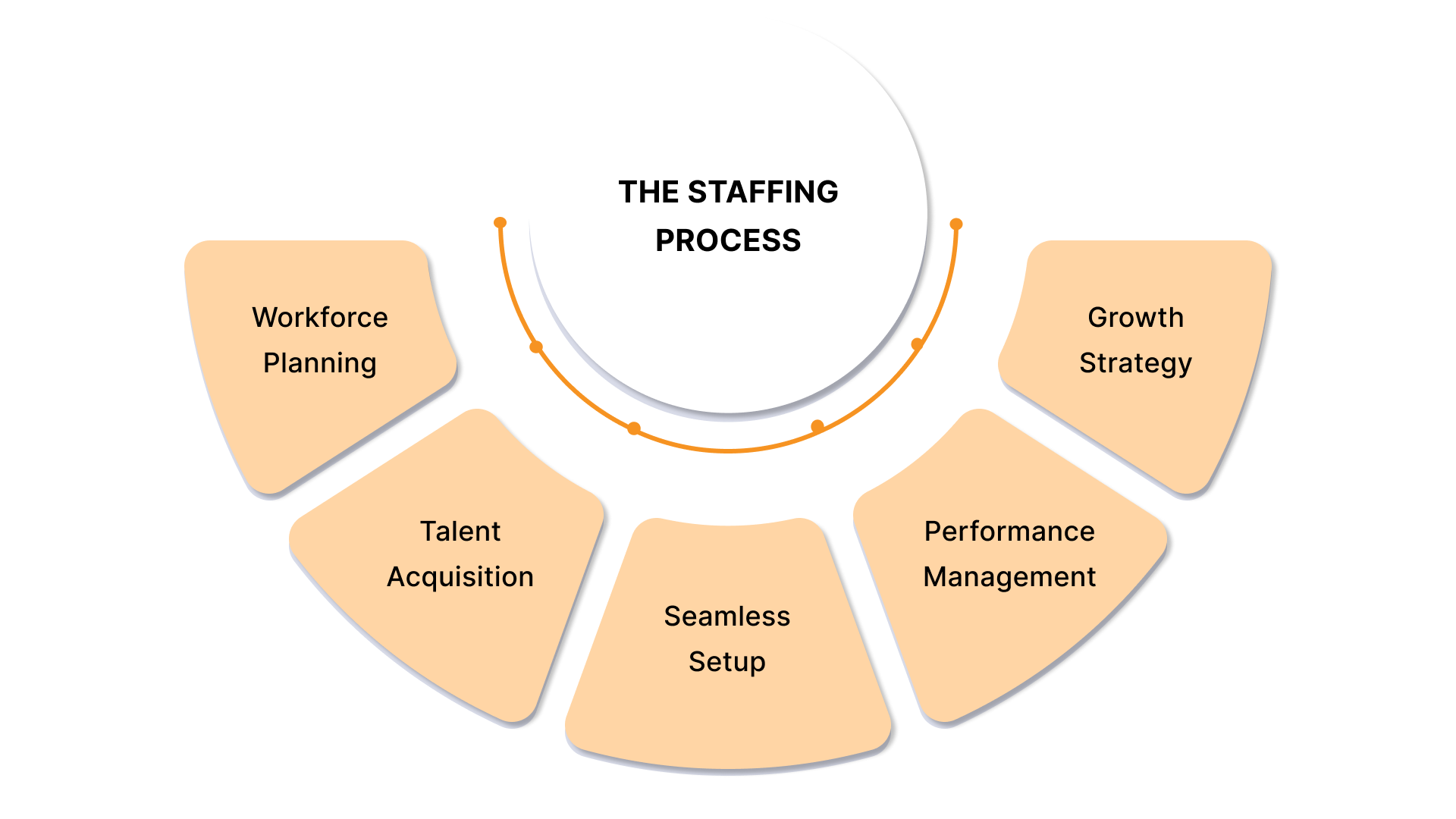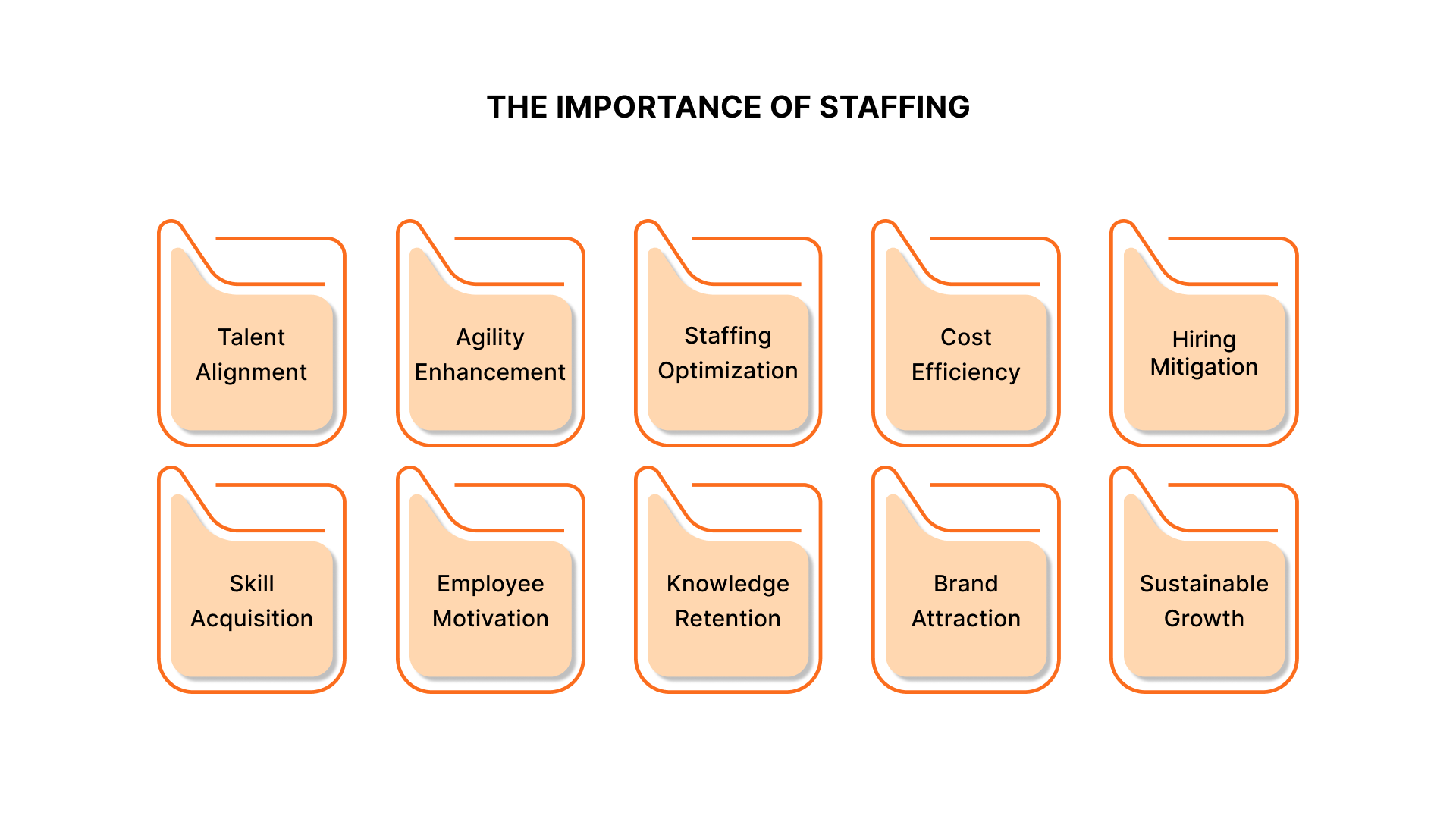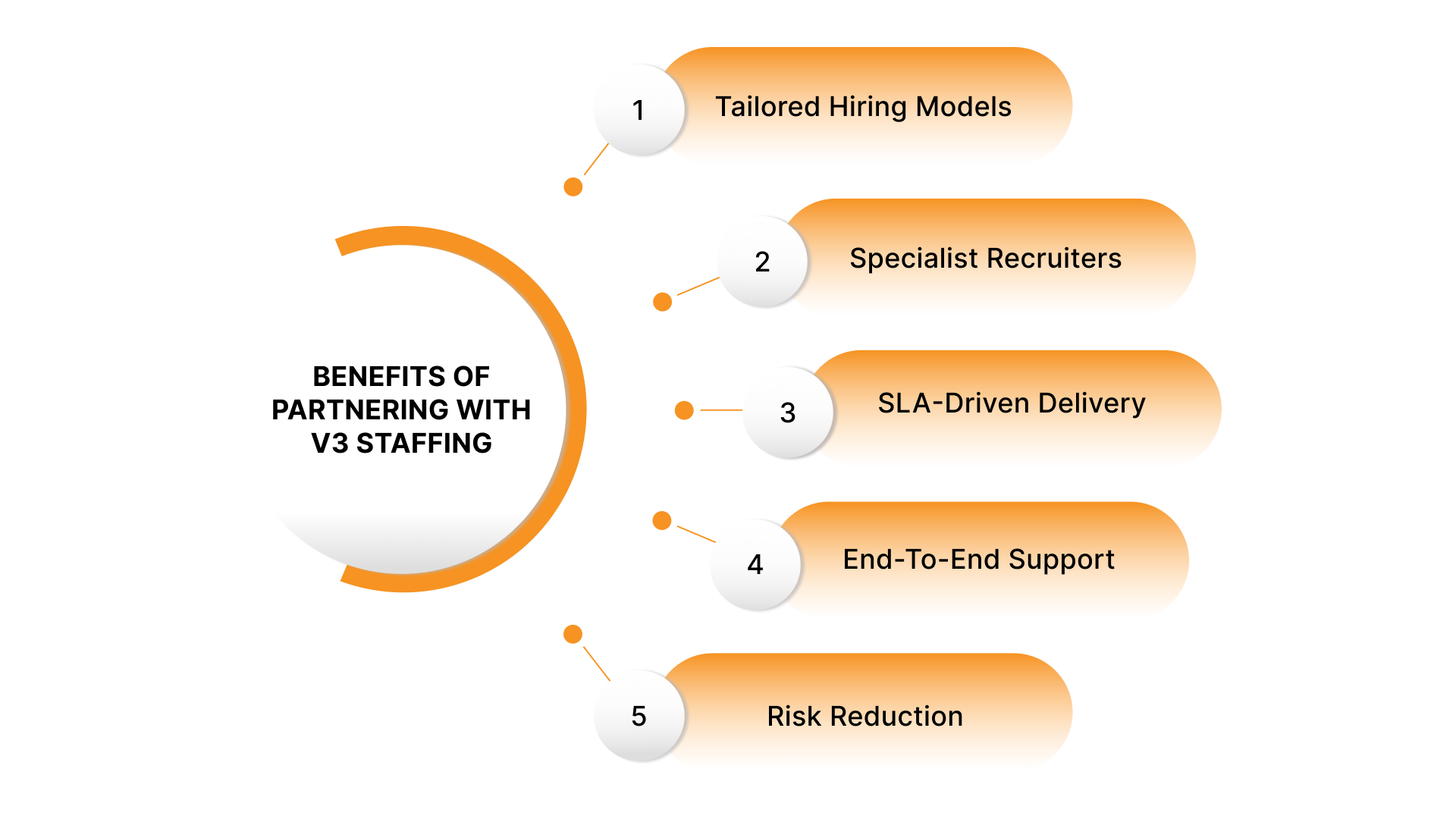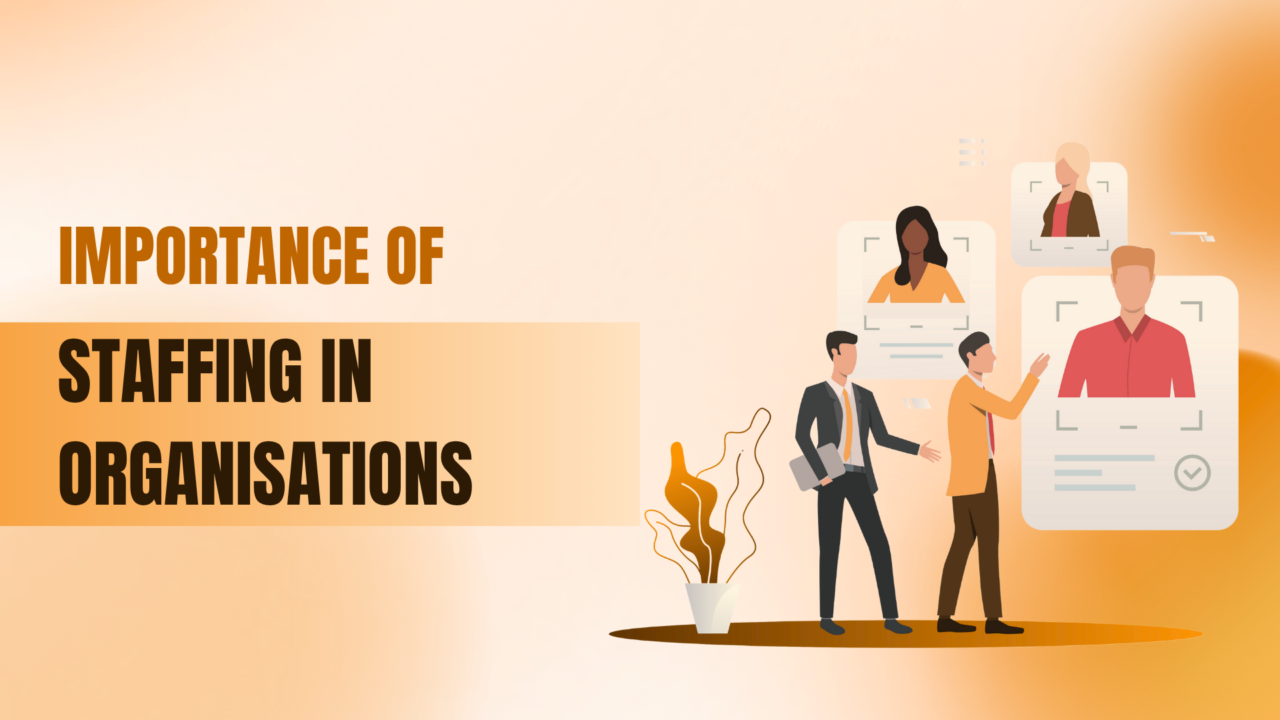Staffing plays an important role in shaping how effectively an organisation operates, grows, and adapts to change. More than just recruitment, it involves placing the right talent in the right roles to support long-term business goals. Effective staffing contributes directly to improved productivity, cultural alignment, and operational agility.
As businesses expand or restructure, strategic staffing ensures that workforce capabilities remain aligned with evolving objectives. It supports continuity, reduces inefficiencies, and strengthens decision-making at every level. Notably, India’s job market was poised for a 9% growth in 2025, highlighting the critical need for structured and forward-looking hiring strategies.
In this blog, we explore the importance of staffing in business success, examining how it influences growth, enhances agility, and supports sustainable organisational development.
key Takeaways
- Strategic staffing aligns talent with business goals, enhancing productivity, culture, and agility.
- Effective staffing ensures operational flexibility, reduces hiring risks, and supports long-term growth.
- Partnering with staffing experts helps organisations access tailored workforce solutions across India, boosting efficiency and scalability.
- Look for staffing partners with flexible hiring models, domain expertise, and a strong delivery track record.
Understanding Staffing for Businesses
Staffing is far more than an administrative function; it is a strategic pillar that influences every aspect of an organisation’s performance. For businesses aiming to thrive in complex and fast-changing markets, understanding the principles and processes behind staffing is essential.
What Is Staffing?
Staffing refers to the end-to-end process of identifying, recruiting, selecting, training, and retaining individuals to fulfil specific roles within an organisation. It involves not only filling vacancies but also forecasting future talent needs and developing a workforce capable of supporting long-term business goals. In a competitive landscape, effective staffing ensures the right blend of skills, experience, and cultural fit.
Key Components of the Staffing Process

The staffing process typically includes several key components:
- Workforce Planning: Assessing current capabilities and forecasting future talent requirements based on business strategy.
- Talent Acquisition: Sourcing, screening, and selecting candidates through structured recruitment methods.
- Onboarding and Integration: Introducing new hires to the company’s culture, tools, and expectations.
- Performance Management: Ensuring individuals are supported and evaluated to drive performance.
- Retention and Development: Investing in employee growth to maintain engagement and reduce attrition.
Each stage contributes to building a strong, responsive workforce that can adjust to business needs as they evolve.
Role of Staffing in Business Efficiency and Agility
Strategic staffing ensures organisations remain agile by providing access to talent that can quickly adapt to market changes, project needs, and new technologies. It minimises delays, optimises workforce use, and reduces the need for reactive hiring. With a structured staffing approach, whether through permanent, temporary, or contract models, organisations can make quicker decisions and improve operational efficiency.
The quality of staffing also shapes organisational culture. Employees who are well-suited to their roles tend to be more engaged and collaborative, fostering a positive work environment. Thoughtful staffing also ensures leadership continuity and supports company values, which are vital for long-term success and reputation.
Also Read: Types of Organisational Culture: What You Must Know
As we’ve understood, staffing shapes not only operations but also culture and agility across the organisation. To understand its full impact, let us now examine the importance of staffing, which is fundamental to business success and long-term growth.
The Importance of Staffing

Effective staffing is the cornerstone of sustainable business performance. It goes beyond fulfilling vacancies to actively shaping how an organisation grows, adapts, and competes. From aligning talent to business objectives to enabling long-term scalability, strategic staffing delivers measurable value across all functions.
1. Aligning Talent with the Right Roles
Placing the right individual in the right role is essential for both immediate impact and long-term retention.
- Matching Skills to Job Requirements: Accurate job matching ensures that employees are equipped to deliver results from the outset, reducing time spent on onboarding and corrections.
- Reducing Mismatches and Enhancing Productivity: Minimising hiring mismatches leads to improved job satisfaction and higher individual output, positively impacting team dynamics.
- Long-Term Benefits of Role Alignment: Employees who are well-suited to their roles are more likely to grow within the organisation, reducing attrition and succession gaps.
2. Improving Organisational Flexibility
Adaptability is vital in an environment of constant change, and staffing plays a key role in enabling it.
- Adapting to Market and Business Changes: As demand fluctuates, staffing flexibility allows organisations to scale their teams without compromising timelines or budgets.
- Temporary and Contract Staffing as Solutions: Engaging temporary and contract professionals provides quick access to talent, ideal for short-term projects or specialised tasks.
- Building a Scalable Workforce: A well-planned staffing model makes it easier to expand into new regions, functions, or verticals with minimal disruption.
Also Read: What Skills Are Most in Demand in India’s IT Sector in 2025?
3. Boosting Productivity Through Effective Staffing
Staffing influences overall productivity by ensuring that teams are structured to perform at their best.
- Maximising Employee Performance: Employees placed according to strengths and capabilities are more motivated, engaged, and likely to exceed performance expectations.
- Reducing Turnaround Times and Delays: Well-staffed teams operate with fewer bottlenecks, reducing project delays and service backlogs.
- Achieving Organisational Goals with the Right Talent: When talent aligns with business strategy, organisations are better equipped to meet KPIs and drive sustained growth.
4. Optimising Costs with Strategic Staffing Decisions
Staffing decisions can significantly influence operational costs and financial planning.
- Reducing Recruitment and Training Expenses: Hiring the right candidates the first time minimises the need for frequent replacements and retraining.
- Leveraging Temporary and Part-Time Workers: Employing flexible workforce models helps reduce overheads without compromising output.
- Maximising ROI on Human Resources: By aligning human capital investment with business priorities, organisations improve their return on every hire.
Also Read: The Role of Employee Value Proposition (EVP) in Permanent Recruitment
5. Mitigating Hiring Risks
Hiring carries inherent risk, but the right staffing approach significantly reduces exposure.
- Reducing Bad Hires with Professional Staffing: Partnering with experienced staffing providers helps eliminate unsuitable candidates early in the process.
- Comprehensive Screening and Assessment: Rigorous assessment protocols, including technical, behavioural, and cultural, ensure a well-rounded evaluation.
- Minimising Employee Turnover: A thoughtful staffing approach contributes to a stable workforce, reducing churn and its associated costs.
6. Accessing Specialised Skills
Modern businesses increasingly require niche expertise that is not readily available through traditional hiring.
- Filling Skill Gaps with Niche Expertise: Staffing partners provide access to curated pools of professionals with highly specialised skill sets.
- Fostering Innovation through Specialised Talent: Specialists bring fresh perspectives and advanced competencies, helping companies stay at the forefront of their industries.
- Staying Competitive with Cutting-Edge Skills: Consistent access to emerging skills ensures the organisation can adopt new technologies and practices without delay.
7. Enhancing Employee Morale and Engagement
The right staffing decisions improve more than output and shape the internal culture of the organisation.
- Creating a Positive Work Environment: A well-matched workforce fosters better communication, collaboration, and morale.
- Career Development and Growth Opportunities: Staffing aligned with potential enables career advancement, supporting internal mobility and retention.
- Reducing Turnover through Thoughtful Staffing: Employees who feel valued and see a path forward are more likely to remain committed to the organisation.
8. Knowledge Transfer and Continuity
Sustaining business operations over time requires planning for knowledge continuity and leadership readiness.
- Succession Planning and Leadership Development: Staffing contributes to a strong pipeline of future leaders, enabling smooth transitions.
- Retaining Institutional Knowledge: Experienced hires and internal promotions preserve domain knowledge and process expertise.
- Maintaining Business Continuity through Staffing: With the right talent in place, business operations can continue seamlessly despite unforeseen changes.
9. Strengthening Brand Reputation and Attracting Talent
Staffing practices have a direct influence on how the market perceives an employer.
- Building an Employer Brand that Attracts Top Talent: A consistent, professional hiring process reflects positively on an organisation’s brand.
- Creating a Positive Organisational Culture: People-centric staffing supports inclusive, engaged, and high-performing diverse teams.
- Becoming an Employer of Choice: Companies that prioritise strategic staffing are more likely to attract top-tier candidates in competitive markets.
10. Supporting Long-Term Organisational Growth
Ultimately, staffing is central to scaling operations in a structured and sustainable manner.
- Strategic Staffing for Sustainable Growth: As businesses expand, a consistent pipeline of the right talent ensures momentum is maintained.
- Preparing for Expansion through the Right Talent: Whether entering new markets or launching services, staffing enables readiness from day one.
- Planning for Future Business Needs: Forward-thinking staffing builds flexibility and resilience into the organisation’s long-term workforce strategy.
While strategic staffing lays the groundwork for business growth, its impact extends well beyond initial hiring. A thoughtfully staffed organisation is better positioned to retain talent and reduce turnover, critical factors in sustaining long-term success.
Managing Employee Retention and Reducing Turnover
Retaining talent is a strategic priority for any organisation aiming for long-term success. While hiring the right people is essential, keeping them engaged, motivated, and aligned with business objectives is equally important. High turnover leads to increased recruitment costs, loss of knowledge, and operational inefficiencies, all of which can be mitigated through thoughtful staffing practices.
The Role of Effective Staffing in Employee Retention
Retention begins with making the right hiring decisions. When staffing focuses on more than just technical skills, taking into account cultural fit, career goals, and long-term compatibility, it lays a solid foundation for employee loyalty. Employees who feel aligned with their roles and the company’s vision are more likely to stay, perform, and grow.
Poor job alignment, unclear expectations, or lack of growth opportunities often lead to early exits. By integrating comprehensive screening, realistic job previews, and structured onboarding into the staffing process, businesses can reduce these mismatches and build a more engaged workforce from the outset.
Creating a Long-Term Workforce Strategy
Reducing turnover is not just about immediate fixes; it requires long-term workforce planning. Strategic staffing supports succession planning, leadership development, and knowledge continuity, helping organisations prepare for future growth and transitions.
This approach also includes investing in employee development, offering career progression pathways, and aligning compensation with market standards. When supported by a proactive staffing model, these elements help build a stable and motivated workforce that sees long-term value in staying.
While internal strategies can help improve retention and reduce turnover, partnering with the right staffing expert can significantly amplify those efforts. This is where V3 Staffing adds measurable value by delivering tailored, reliable, and industry-aligned workforce solutions.
How V3 Staffing Helps Businesses Achieve Staffing Excellence
V3 Staffing offers more than just recruitment; it delivers workforce strategies tailored to the needs of mid to large enterprises across India. With delivery hubs in Hyderabad, Bengaluru, Chennai, Pune, Delhi NCR, and Mumbai, V3 Staffing serves Indian and international firms seeking dependable talent support in dynamic market conditions.
Our services span Permanent Recruitment, Temporary Staffing, IT Staffing, RPO, and Executive Search. Whether you’re looking to scale a tech team, build leadership pipelines, or manage short-term contract hiring, we align talent to business outcomes.
Key Advantages of partnering with V3 Staffing:

- Tailored Hiring Models: Flexible recruitment solutions based on project scope, skill demand, and organisational goals.
- Specialist Recruiters: Domain experts who understand the nuances of tech, BFSI, manufacturing, and shared services hiring.
- SLA-Driven Delivery: Every engagement is governed by clear timelines, quality metrics, and accountability standards.
- End-to-End Support: From role scoping to onboarding, V3 manages the full hiring lifecycle to reduce client effort and time-to-hire.
- Risk Reduction: Rigorous screening, cultural alignment checks, and offer-to-join management to reduce attrition and mismatches.
We also embed recruitment teams through RPO solutions, support niche leadership roles via Executive Search, and offer regional hiring coverage for Tier-II cities through dedicated sourcing channels.
In a competitive talent landscape, V3 Staffing helps you stay ahead by combining speed, precision, and regional expertise.
Conclusion
Effective staffing is central to building a productive, resilient, and future-ready organisation. From aligning talent to driving growth, strategic hiring decisions directly impact business success. Partnering with a specialist like V3 Staffing enables companies to access dependable, tailored workforce solutions across India’s key markets. Whether you need to scale quickly, hire niche talent, or improve retention, V3 brings the expertise and reach to support your goals.
Looking for a recruitment partner who understands your hiring challenges? Contact V3 Staffing today and strengthen your workforce with precision and confidence.
FAQs
Q. Why is staffing important in an organisation?
A. Staffing ensures the right individuals are placed in roles that match their skills and the organisation’s goals. It directly impacts productivity, employee morale, and long-term success by aligning talent with business needs and enabling efficient operations.
Q. What are the 7 important functions of staffing?
A. The seven key functions of staffing include:
- Manpower planning
- Recruitment
- Selection
- Placement
- Training and development
- Performance appraisal
- Promotion and career planning
These collectively support talent acquisition, growth, and retention within the organisation.
Q. What is staffing in the 5 functions of management?
A. Staffing is one of the five core functions of management, alongside planning, organising, directing, and controlling. It involves identifying workforce needs, recruiting suitable candidates, and developing employees to ensure effective performance and organisational continuity.
Q. What are the three important elements of staffing?
A. The three essential elements of staffing are:
- Workforce Planning: Assessing future talent needs
- Recruitment and Selection: Attracting and choosing the right candidates
- Development and Retention: Training, upskilling, and ensuring employee longevity
Together, they form the foundation of effective human resource management.




